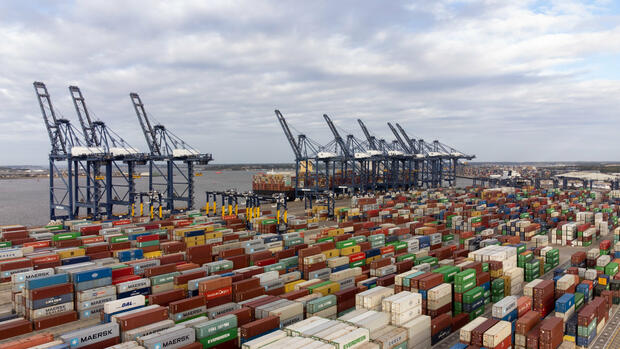The British Chamber of Commerce in Germany sees signs of better trade relations between Germany and Great Britain.
(Photo: dpa)
London Three years after Great Britain officially left the EU, the British Chamber of Commerce in Germany (BCCG) sees the first signs of a turnaround in economic relations, which have been severely damaged by Brexit. For the year 2023, every third company expects growing sales in Great Britain.
With a view to the next five years, almost half of the 136 companies surveyed by the auditing firm KPMG on behalf of the BCCG expect sales to increase. Last year, a majority of companies reported falling sales and profits.
“Great Britain remains an important economic partner on its own doorstep for the German economy,” says KPMG divisional director Andreas Glunz with certainty.
Glunz also points out that trade flows and direct investments have also developed positively for the first time in six years. In the previous year he had lamented the “shambles” that Brexit had left in German-British trade.
By reaching an agreement with the EU in the Northern Ireland dispute in March, the British government under Prime Minister Rishi Sunak cleared an important hurdle in the rapprochement with the continental Europeans. Sunak’s “steady-hand pragmatic policy” has restored trust and made people forget the sometimes aggressive and chaotic actions of his predecessors Boris Johnson and Liz Truss, says BCCG President Michael Schmidt. To improve the climate but also the visit of King Charles III. contributed in Germany.
Trade agreement with the EU is to be improved
For the British, the survey results are a welcome ray of hope after several foreign companies had expressed doubts about the location Great Britain last week. The carmaker Stellantis, for example, threatened to close a plant in Ellesmere Port if Brussels and London did not change the post-Brexit rules of origin for electric vehicles built in Great Britain. The Japanese manufacturer Nissan has also questioned the UK production site.
Car manufacturers in Great Britain warn of locational disadvantages.
(Photo: Reuters)
It is politically interesting that both Prime Minister Sunak and opposition leader Keir Starmer are pushing for the trade and cooperation agreement with the EU to be improved in their mutual interest. “This shows a pragmatic convergence course, which should not change even after a possible change of government after the upcoming parliamentary elections,” suspects KPMG partner Glunz.
However, there are still areas of friction between London and Brussels. The British are currently struggling to win the contract for a new battery factory that the Indian Tata group wants to build in Europe. Also in the running is EU member Spain. According to reports in the British media, the government in London has promised India state aid of 500 million pounds (570 million euros). Tata is the parent company of the largest British carmaker Jaguar Land Rover (JLR), which is currently in the process of converting its model range to electric drives.
Location competition with the EU has also intensified in the production of semiconductors. The British government has now announced that it intends to subsidize chip development in Great Britain with around one billion pounds over the next ten years.
“Our new strategy focuses our efforts on areas where we are strong, such as research and design,” Sunak said. The opposition Labor party thinks that’s not enough and points out that the USA wants to support its chip location with 52 billion dollars and that the EU has made 43 billion euros available for it.
Great Britain lures with less regulation
Although Great Britain has suffered as a business location as a result of Brexit, it has evidently not lost its attractiveness: a quarter of the companies surveyed by KPMG consider the economic climate on the island to be better than that in the EU or Germany – and just as many praise the fewer regulations Through the state. “Because of the less regulation, Biontech has relocated part of its research to Great Britain,” says Glunz. The British would now take advantage of the fact that they no longer have to comply with EU law.
However, what is being hailed by Conservatives in London as the “Brexit dividend” is a double-edged sword. “Should the gap between Great Britain and the EU in environmental, consumer or tax law become too great, this could lead to new friction with Brussels,” warns BCCG boss Schmidt.
Sometimes, however, the Brexit supporters simply promise more than they can keep: Recently, the British Minister for Economic Affairs, Kemi Badenoch, had to postpone the timetable for the abolition of all old EU rules on the island due to the bureaucracy being overloaded.
More: Brexit rules are becoming a competitive disadvantage for European car manufacturers
